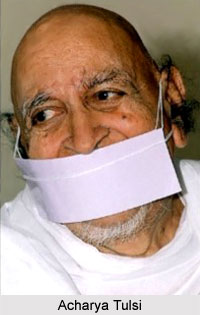 Tulsi was a Jain Acharya. He is credited with writing more than hundred texts. He is also regarded as the founding father of the Anuvrata. Right from his early childhood days he displayed brilliant qualities of head and heart that gave indications of his greatness as well as his divine inclinations. He remained detached from all worldly pleasures and at the tender age of eleven renounced the materialistic world.
Tulsi was a Jain Acharya. He is credited with writing more than hundred texts. He is also regarded as the founding father of the Anuvrata. Right from his early childhood days he displayed brilliant qualities of head and heart that gave indications of his greatness as well as his divine inclinations. He remained detached from all worldly pleasures and at the tender age of eleven renounced the materialistic world.
Early Life of Acharya Tulsi
Acharya Tulsi was born into a pious and religious household of Jain traders in Ladnun. He was born in 1914 to father Jhumarmal Khated and mother Vadana ji. He displayed early leadership qualities since his school days. At the age of eleven he took the vow of a monk He with notable commitment. Gradually he grew up and by the time he was 16, he began attracting followers. The dynamic and vibrant spirit of the young boy attracted the attention of Kalugani who nominated him to be his successor. He was then just twenty two years old. This is regarded as a rare incident in the history of Jainism that a twenty two year young boy has been given the responsibility of Head of Terapanth group.
Later Life of Acharya Tulsi
Acharya Tulsi was a great visionary. For the upliftment of the mental, ethical and emotional status of his followers he conceived several innovative ideas, programmes and schemes. This also helped to strengthen and encourage the faith and confidence of the entire population at large. He had the distinctive quality to translate his vision into actual practice. He initiated more than 776 monks and nuns. He is also an accomplished poet, author and also a notable religious leader. Formation
Acharya Tulsi displayed great vigour and enthusiasm in conceiving and as well as implementing the Anuvrat Movement for ethical regeneration of the nation. The movement began on March 2nd, 1949. There are five tenets of Anuvrat which are Truth, Ahimsa, Non Possession, Non-stealing and Celibacy. These five tenets became the five pillars of this movement for transforming the real life of persons. Since the development of the Anuvrat Movement by Acharya Tulsi it was been successful in inspiring millions of people to practice purity and self-discipline in their individual life. The ultimate objective of the Movement is to create a non-violent socio-political world order with the help of a world wide network of self-transformed people.
Thirty-four years earlier, Dharmdoot was once going through a research journal. While travelling he once got the notion of editing the Jain Agams (Jain Holy Scriptures) by doing research on them. The Agams form a significant part of the Jain tradition. It was a complex and difficult task to edit, annotate and comment upon Lord Mahavira`s precepts dating back to 2500 years ago.
However, Acharya Tulsi`s strong determination helped in fulfilling the task. Thus the credit for the performance of the task goes to him and his able successor`s hard work and power and enthusiasm. It is exclusively the outcome of the untiring efforts of Anuvrat Anushasta Shree Tulsi, Acharya Mahapragya and other saints and nuns.




















